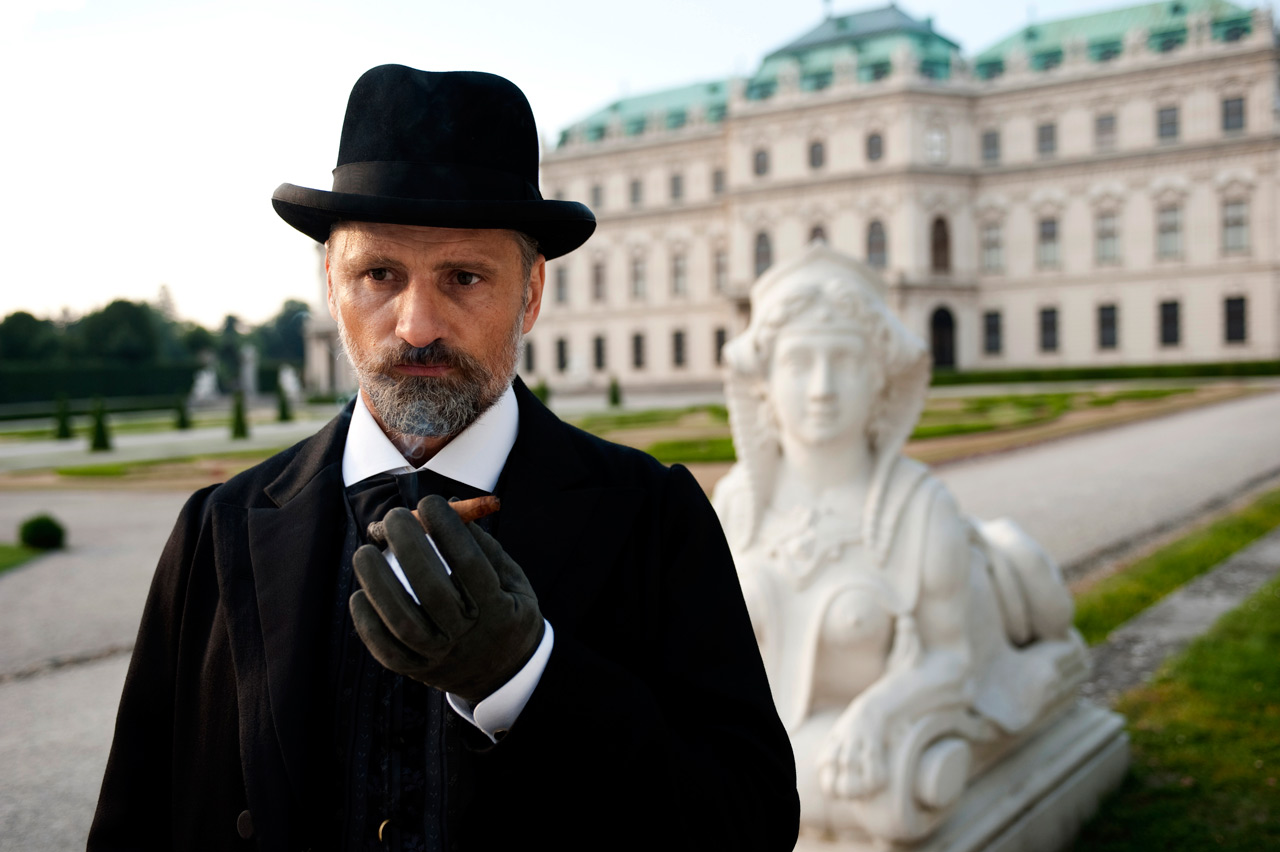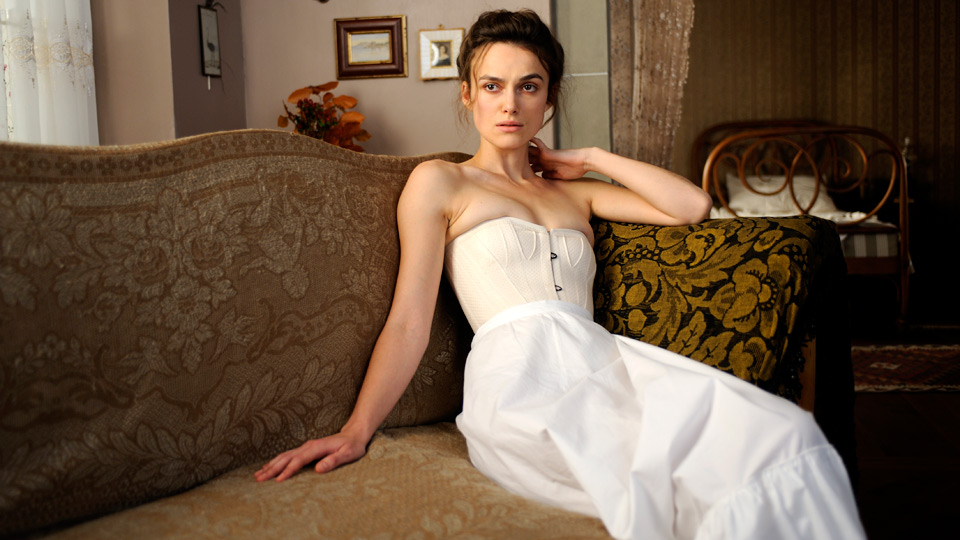
A Dangerous Method
I almost spat Coke into my popcorn when I saw the trailer for A Dangerous Method. Biopic? check. Costume drama? Check. "A Film by DAVID CRONENBERG," huh? I knew Viggo Mortensen's main man had a new film coming out, but a Knightley-Fassbender period romance was hardly what I expected. It's not that the subject matter — Freud, Jung, and the birth of psychoanalysis — is a bad match. More like a redundancy. Cronenberg's body of work can already be partly understood as a compendium of his feelings on Freud and a century of psychoanalytic thought. What's to be gained from a straight take on material that he's twisted and transformed, so imaginatively and elegantly, time and again? I know it's obnoxious for a critic to insist that a movie should be something it isn't, but I can't fight the feeling. The English major in me is impressed by the intellectual ambition and writerly craft that went into this careful portrait of Jung, Freud, and their lesser-known sidekick Sabina Spielrein. It catches in the periphery of its gaze the plight of the Jews, the tragedy of the World Wars, and something about the mood of the 20th century. But it's more educational than compelling. The cinephile in me longs for a real Cronenberg screenplay, which might have made something odd and truly majestic out of this historical triangle.
Freud (Mortensen) and C.G. Jung (Michael Fassbender) bonded over ideas in their nascent field of study and later grew apart — Jung questioned Freud's preoccupation with sexuality and Freud was appalled by the younger man's forays into religious thinking. As dramatized in A Dangerous Method, their relationship pivots on Jung's boundary-crossing relationship with patient Spielrein (Keira Knightley). A cocaine-addicted libertine named Otto Gross (Vincent Cassell, of course), a fellow analyst commended to Jung's care by his mentor, seems to convince Jung that he should be fucking the woman, and for her own good. (She does make herself sexually available, allowing him to minimize his feelings of impropriety.) Stung by Jung's inevitable disavowal of their relationship (like an idiot, he initially lies about it even to Freud himself), Spielrein blossoms on her own, fast becoming a leading figure in the psychoanalytic community, with ideas about the human sexual urge that may have inspired Freud himself. Much of the film treats Jung as a less rational reflection of Freud, with intellectually questionable leanings toward spiritual ideas. But at film's end, Jung relates to Spielrein a dream that actually seems to function as prophecy, burnishing the claims he makes for the mystical.
I doubt that Jung ever really saw the future, but in most other regards the film is scrupulously grounded in real events involving famous men. The muted result is a barely disguised stage play cum history lesson. It's based on screenwriter Christopher Hampton's play The Talking Cure, and it's a talking movie, too, its action consisting almost entirely of iconic people sitting around gabbing, often sharing too-pointed summaries of their positions, or assessments of their places in the annals of psychotherapy. Freud sees himself as Christopher Columbus; Jung sees him as Galileo. One scene imagines the coining of the actual term psychoanalysis. Much of the script is based in part on actual written correspondence between the men, so for all I know its historical bona fides are intact. As utility cinema, it works — it's an efficient delivery mechanism for information that might otherwise be conveyed, in more detailed, time-consuming form, via the printed word.
The film started to lose me early on, as Jung subjected his wife to a word-association test with Spielrein in the room, eliciting on-the-money responses to posers like "divorce" and "ruefulness." For a time, Knightley's oddly amplified, utterly committed performance holds interest — she brandishes half of a Russian accent and, in fits of what was then called hysteria, juts her chin out so far I half-expected to see a Rick Baker credit in the end titles. And it's all adroitly documented by cinematographer Peter Suschitzky, who uses optical tricks to keep two actors in focus in a single shot, emphasizing the doctor-patient relationships between Jung and Spielrein, and Jung and his wife. (Actually, I found these shots distracting. They look at first like textbook split-diopter shots, but there's no clear vertical break, and something about the depth of field characteristics in the foreground portion of the image made me think of tilt-shift photography.) But the scenes — too many of them — built on line after line of historically accurate but awkward, overly mannered dialogue, distract and eventually grate.
Cronenberg keeps the mood fairly light by casting Mortensen, who puts a cigar-chomping twinkle in the eye of Freud, to disperse some of the self-seriousness emanating from Fassbender. And I perked up a bit at the sex scenes, which have the usual Cronenberg back-room-of-the-psyche chill about them — the show-stopper, featuring a topless Knightley in the film's oft-mentioned "spanking" scene, Fassbender whipping her ass from behind, is photographed only in bedroom mirrors, a distancing technique that also suggests the problems of transference and countertransference that are key to Jung's confusion. So Cronenberg earns his pay here. What I miss, I guess, is his usual facility with the absurd, bending his stories around the psychological structures that undergird his characters. One of my favorite exchanges from a Cronenberg film is the love connection made in Videodrome, when sleazy TV programmer Max Renn (James Woods) appears on television opposite crimson-clad radio-show host Nikki Brand (Debbie Harry), who is decrying sensationalism in the media. "You know what Freud would have said about that dress," Woods parries. Her (hilarious) response comes back: "I admit it. I live in a highly excited state of overstimulation." Max asks her out, she accepts, and this leads him further into a trap. Videodrome is a science-fiction film, not a biopic. But it has more provocative things to say about sex, psychology, and the way people live than anything in A Dangerous Method.
Posted by on January 7, 2024 3:55 PM
